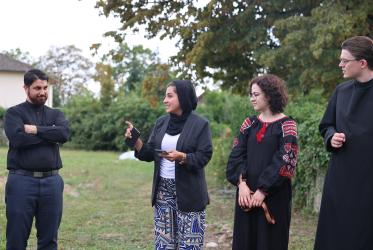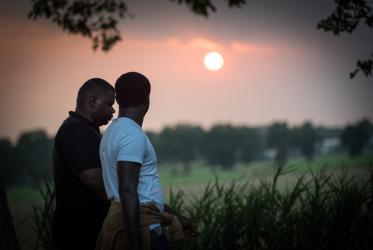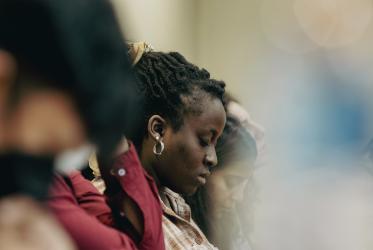Introduction
We, the 27 young people/participants of the WCC Eco School 2019 from 11 countries, who gathered at Chiang Mai, Thailand from 4th to 17th November 2019, jointly organized and hosted by the Christian Conference of Asia and World Student Christian Federation, discussed and deliberated on various ecological issues affecting our planet and people. We considered the nexus between water, food, health and climate change with a justice perspective. As young people and informed participants of the Eco-School we hereby issue the following declaration based on our deliberations.
The acknowledgement of Context
We acknowledge that
- today more than 2 billion people do not have access to safely-managed drinking water and over 4.4 billion people do not have safely-managed sanitation. [1] 795 million people – or one in nine people – go to bed on an empty stomach and nearly 1,000 children die daily from water and sanitation -related diseases.
- Climate change aggravates water and food insecurity. In the current scenario, two-thirds of the world's population could be living in areas of high water stress by 2030 and global agricultural production could decline by as much as 25% by 2050
- Humanity has wiped out 60% of animal populations since 1970, due to our obsession with industrial agriculture and meat industries.
- We young people, under 30 years old, make up 50.5% of the world’s population. We are at the higher risk of facing the brunt of the impacts of climate change in the days to come. Today’s young people are at risk of being worse off than the previous generations, in terms of quality of life and access to basic human rights. We have witnessed young people taking leadership in drawing the attention of world leaders to respond to the urgency of climate change.
The Affirmation after our intense deliberations at the Eco School 2019
We affirm that
- Our God is a God of Life (in all its fullness) who assures and expects wholeness of Life for all the living, now and yet to be and that God inspires and challenges us to live in harmony with nature and actively engage in the redemption and restoration of creation from the maladies of the present day.
- the oikoumene acknowledges the plurality that define co-existence, the kinship of the ‘unequal’ and the common dwelling house of all who are different yet intrinsically the same and that the ecclesia is to be the living example of an alternate life style that affirms Life.
- the care of our common home is our mission and that we should be able to listen to the cry of the groaning creation and the anxiety of generations yet to be born concerned about greed that causes the depletion of resources with which they are to live.
- water is a gift of God, a public good and a fundamental human right for all, and therefore, it must not be privatized.
- Health is a dynamic state of well-being of the individual and society; of physical, mental, spiritual, economic, political and social well-being; of being in harmony with each other, with the material environment, and with God[2]
- there is unacceptable injustice in the sharing of waters, food and in causing the climate emergency that the world is grappling with today.
- every person and every living being has the right to safe, sufficient, continuous, accessible, affordable availability of water and food.
- the poor and the marginalized are the most affected with water, food, health and climate injustice and revolutionary transformation in global hierarchical dynamics is essential towards ensuring justice and wellbeing for all.
- women, children, young people and people living with disability are among the most vulnerable when the communities lack access to clean water or nutritious food, which gets aggravated by the impacts of climate change.
- the climate and ecological crises is a spiritual and moral crises and the inter-faith resources of faith communities are a powerful tool to address them.
The Commitment of the Participants of the Eco School
We pledge our commitment that:
- we commit to a water wise and water just world and shall strive to bring all stakeholders into an inclusive and participatory process of attaining the Sustainable Development Goals including the SDG 6 of water and sanitation for all.
- we will act in solidarity with initiatives towards the dynamic transformation of world economy and behavior patterns of individuals and communities to achieve the goal of limiting our emissions to 1.5 degrees rise of temperature above pre-industrial level.
- we commit to a blue community and green ecclesia
- we will advocate for gender and disability equity and other inclusive approaches in planning, budgeting, mobilizing, distributing, implementing and monitoring the utilization of resources towards a water, food, health and climate just world.
- We will champion the health-promoting churches programme in our churches so that they may be strengthened as healing communities
- we commit to the right of every form of life to have food for required nourishment and protection from unhealthy food and food habits.
- we will not be party to any genetic manipulation of life aimed at profit
- we will do all that is possible towards achieving the decarbonization targets and will promote a carbon neutral lifestyle.
- we will initiate creative local actions and movements towards water justice, health and wholeness, food safety and the mitigation of the climate crisis.
And towards this end, may God, the creator and giver of life help us to be instrumental in saving our planet through our own commitment towards a sustainable lifestyle at home, at our churches and institutions and in the society at large.
Participants of the WCC Eco School 2019
[1] UN Joint Monitoring Programme (JMP) 2017 report on “Progress on Drinking Water, Sanitation, and Hygiene”, https://washdata.org/sites/default/files/documents/reports/2018-01/JMP-…
[2] Healing and Wholeness: The churches’ role in health. The report of a study by the Christian Medical Commission. World Council of Churches; Geneva 1990.




